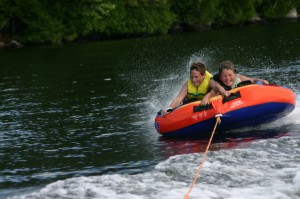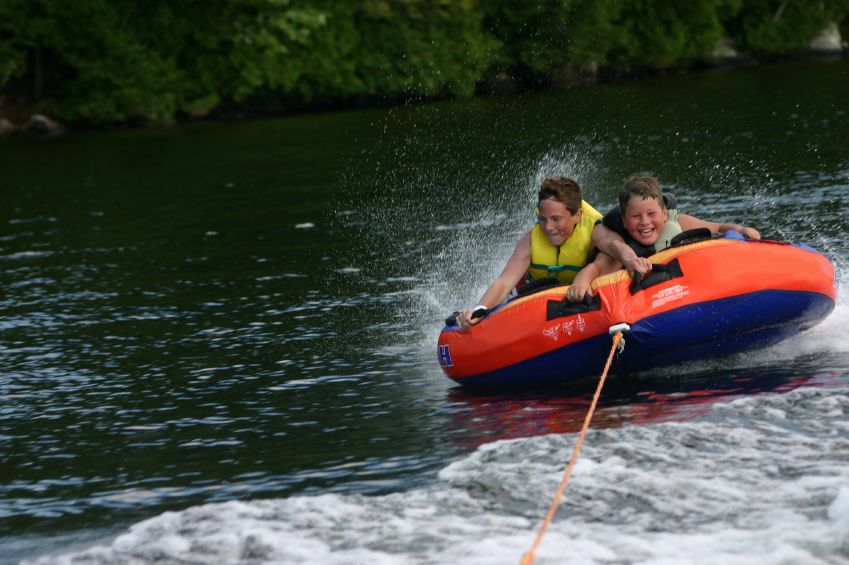Summer is a great time for kids and parents alike. However, due to increased recreational activity, there is also an increase in child injuries and fatalities. Unfortunately, many parents and relatives do not think about safety until after something happens. Here are 10 friendly reminders to help parents think about safety.

10 Ideas to Help Keep Kids Safe During the Summer! The National Safe Kids Campaign estimates that one in four kids ages 14 and younger will sustain an injury that requires medical attention every year. Forty percent of all injury-related ER visits and 42 percent of all injury deaths happen between May and August, they report.
1. Set a good safety example: Kids learn the most from their parents and family. They will copy your safety habits. If you are on a boat, every adult needs to set a good example and wear a properly fitting life vest with all straps buckled. If you are driving in your car, then buckle-up. Put on sunblock. Also, talk to your kids about safety. Explain to them why they need to wear a lifejacket at all times. Have them help you with a playground safety inspection. If you explain the importance of safety to them, they might just listen.
2. Wear a properly fitted Coast Guard approved life jacket: In you are boating, always put your kids in a properly fitted life jacket before you even reach the dock. For $50 you can go to a local boating supply store and purchase a Coast Guard approved life jacket. The Coast Guard approval should be written on the inside of the life jacket. Children’s life jackets are sized by weight, but always try the jacket on with the clothes the child will be wearing. Buckle all snaps and adjust all straps; (make sure there is a groin strap that helps secure the bottom of the vest). Literally, pick the child up by the shoulders of the life jacket to make sure he or she does not slide out of the bottom.
This goes for the pool, too. Unless your child is a strong swimmer, what is the downside of putting them in a real life jacketSwimmy toys give the illusion of safety, but they can be very dangerous.
3. Get in the water with your kids: Supervising your kids from the kitchen window while they swim is not supervision. It is crucial to be within arms reach of your child while they are swimming. A child can quickly go under water and never come back up, all without ever making a sound. If you are in the water with your kids and within arms reach, you can quickly pull them above water if an emergency should occur. Take regular breaks out of the water so the kids can rest. Also beware of crowded pools and losing sight of your child due to the hustle and bustle of the crowd.
4. Do not swim long distances in large bodies of water: I bet you can’t swim to the other side of the cove is a dare that kills many older children. Judging the true distance on a lake or ocean is difficult. What may seem reachable may turn out to be substantially further than one had thought prior to starting.
5. Sunscreen: It seems boring, but sunscreen is crucial in reducing the risk of skin cancer later in life. Skin cancer is not just some inconvenient mole. It can be serious cancers like melanoma, which can spread throughout the body and be fatal. With so many options on the market today (spray on, sticks, lotions,) it is easy to find one that works. Purchase one that matches the activity. Cover all body parts that will be exposed. Usually, the higher the SPF, the better protection.
6. Properly secured and fitting car seat: There is nothing more gut wrenching than seeing a seriously injured child. It makes it even sadder if the child was injured as a result of not being in a properly secured or fitted car seat or not being in a car seat at all. Every car seat comes with pictures on how to property position the belts around the child and how to secure the seat to the car. All newer cars have anchors that allow the car seat to attach quickly and easily. Make sure the car seat latches are snapped into the anchors and are secure. When the child is in the car seat, make sure the straps are snug enough to brace the child should there be an accident. The belts at the shoulders should be at or above the shoulders, not below.
7. Fireworks: Leave the fireworks to the professionals and take ear protection when you go to a public display. Even in current economic cutbacks, there are always some free fireworks displays. Sparkler type fireworks are generally legal in Georgia, but high powered fireworks are routinely purchased in neighboring states and unlawfully used in Georgia. Any fireworks that shoot projectiles or explode can blind, deafen or seriously injure a child. Never let a child handle a firecracker. Likewise, even lawful sparklers can get substantially hotter than an oven and cause serious and permanent burns or ignite clothing and shoes.
8. Biking helmets: Many parents never wore a helmet when they were a kid, so they think it is no big deal not to wear one. Wrong! Head trauma and concussions are serious injuries which can be permanently debilitating and potentially life threatening. A helmet dramatically reduces the chances of minor injuries turning into serious ones.
9. Inspect the playground: Playgrounds are great fun for kids and parents alike. Before kids should be allowed to play, parents should Look Up, Look Down and Look All Around. Look Up: make sure that tree branches are in good shape, not rotted and no large branches over the playground. Check for low hanging branches that could poke an eye. Also double check for low or frayed electrical lines and wires. Look Down: see if there are any tripping hazards. Kids run around playgrounds full of energy. Ensure that surfaces are even. Also look for the presence of material that would soften a fall such as mulch or ground tires and make sure there is a sufficient amount. Look All Around: Check the age, condition and stability of the equipment. Make sure that swings are not frayed. Look for improperly maintained equipment that could cut, pinch or fall. Talk to your kids about safety on the playground and encourage them to report any of their safety concerns to you.
10. Put the phone away: Due to Smartphones, parents can now take a moment to catch up on the news, network via social media and communicate with work or friends. Some people do it while driving, which is illegal, dangerous and not smart. Some do it when they should be watching their children, which is also dangerous and not smart. Parents must be vigilant when watching out for their kid’s safety.
At A. Bishop Law, our Georgia Attorney welcomes any questions on Georgia laws.  Please Call or Email us with any questions; we provide a confidential and free consultation to discuss your matter.
About the author: Anne Bishop is a Hall County Georgia Safety and Injury lawyer with Breakfield & Associates, Attorneys in Gainesville, Georgia and handles various Safety and Injury matters. Â Hall County (Gainesville, Oakwood, Flowery Branch), White County (Cleveland), Barrow County (Auburn, Bethlehem, Braselton, Carl, Statham, Winder), Lumpkin County (Dahlonega), Gwinnett County (Buford, Duluth, Sugar Hill, Lawrenceville), Jackson County (Braselton, Commerce, Hoschton, Jefferson, Pendergrass), Dawson County (Dawsonville), Habersham County (Demorest, Cornelia), Clarke County (Athens) and all of Northeast Georgia.
This article is intended for informational purposes only and should not be relied upon as professional legal, medical or safety advice.




